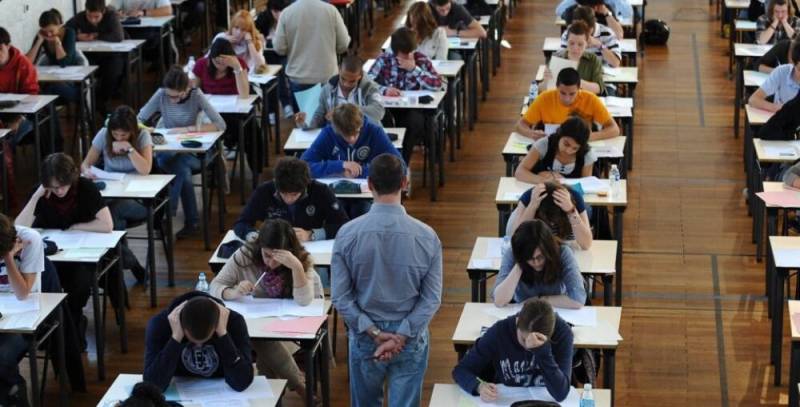
When I logged in to Facebook on 12th August, my timeline was full of dispirited and frustrated O and A Level students expressing displeasure over their results. After the coronavirus pandemic compelled educational institutions across the world to shut down their operations for an indefinite period of time, one of the daunting, unprecedented tasks examination boards faced was deciding the procedure of conduct the exams. Thousands take the examinations organised by Cambridge Assessment International Education (CAIE). The latter announced that they will be grading students by using an algorithm that takes students' past exam scores and grades predicted by their teachers into account. By all means, it was a problematic strategy and it was only students who had to face the brunt of their terrible planning.
There are, at the very least, three major grievances with British Council's decision that should propel Pakistan to take a leaf out of Scotland's book in ensuring that its students are graded fairly. Firstly, past performances should never be the criteria to judge a student. Students learn from their past mistakes and they strive to improve. They also get complacent after getting a good result and their grades plummet in future. Secondly, anyone who has attended a school would be fully aware of the bias and favoritism prevalent in schools which casts a doubt on the grades predicted by teachers. Thirdly, students expend extensive time and effort to secure good grades. Grading through a standardized algorithm undermines the hard work put forth by students. Either they could have postponed the results until things get back to normal and refund the fee or they should have followed the Advanced Placement's method of conducting browser-based exams.
Commenting on the results, award-winning teacher Ahmed Saya wrote a lengthy Facebook post about his concerns with the CAIE results. "We request CAIE to keep this into consideration that these are unprecedented times. Benefit of doubt should be in students' favour so that it should not aggregate the distress that is already there," he said. He further went on to ask, on behalf of the students who have received a U, that how can someone be ungraded when they have not even appeared for the exam.
https://twitter.com/FFTEduDatalab/status/1293830851772506112
Adeel Iqbal Paperwala, who is part of the teaching faculty at various O and A Level institutions in Karachi, said: "Students deserving Bs and Cs are rewarded with As but students deserving As and Bs and rewarded with Cs and Ds. Unable to understand how the final grades are rewarded."
Perhaps Ellie French, a student based in Essex and whose statement has been published in various UK newspapers, best explained CAIE's grading policy. “It seems like they just randomly choose who can go up and who can go down,” she complained.
A Level results are paramount to deciding the career of students and this kind of carelessness just goes on to show that instead of caring about the future of students, these educational institutions are just obsessed with minting money.
Surely, the students can retake the exams in the October/November session, or appeal to their institution for a change in grade, but being a top-tier exam board, Cambridge Assessment International Education (CAIE) should have had a better grading policy at the first place.
There are, at the very least, three major grievances with British Council's decision that should propel Pakistan to take a leaf out of Scotland's book in ensuring that its students are graded fairly. Firstly, past performances should never be the criteria to judge a student. Students learn from their past mistakes and they strive to improve. They also get complacent after getting a good result and their grades plummet in future. Secondly, anyone who has attended a school would be fully aware of the bias and favoritism prevalent in schools which casts a doubt on the grades predicted by teachers. Thirdly, students expend extensive time and effort to secure good grades. Grading through a standardized algorithm undermines the hard work put forth by students. Either they could have postponed the results until things get back to normal and refund the fee or they should have followed the Advanced Placement's method of conducting browser-based exams.
Commenting on the results, award-winning teacher Ahmed Saya wrote a lengthy Facebook post about his concerns with the CAIE results. "We request CAIE to keep this into consideration that these are unprecedented times. Benefit of doubt should be in students' favour so that it should not aggregate the distress that is already there," he said. He further went on to ask, on behalf of the students who have received a U, that how can someone be ungraded when they have not even appeared for the exam.
https://twitter.com/FFTEduDatalab/status/1293830851772506112
Adeel Iqbal Paperwala, who is part of the teaching faculty at various O and A Level institutions in Karachi, said: "Students deserving Bs and Cs are rewarded with As but students deserving As and Bs and rewarded with Cs and Ds. Unable to understand how the final grades are rewarded."
Perhaps Ellie French, a student based in Essex and whose statement has been published in various UK newspapers, best explained CAIE's grading policy. “It seems like they just randomly choose who can go up and who can go down,” she complained.
A Level results are paramount to deciding the career of students and this kind of carelessness just goes on to show that instead of caring about the future of students, these educational institutions are just obsessed with minting money.
Surely, the students can retake the exams in the October/November session, or appeal to their institution for a change in grade, but being a top-tier exam board, Cambridge Assessment International Education (CAIE) should have had a better grading policy at the first place.
